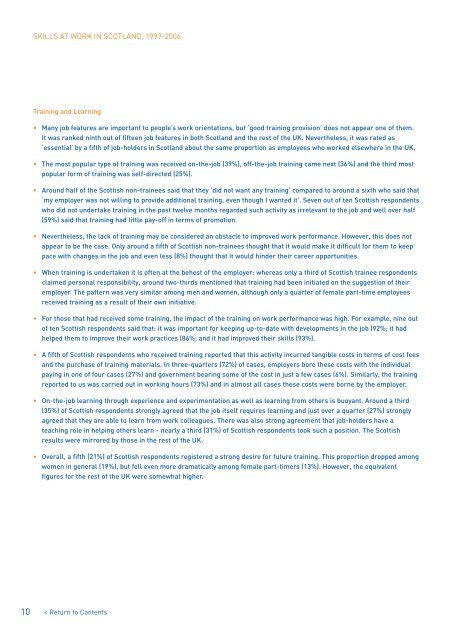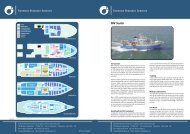Skills at Work in Scotland 1997 to 2006 - Scottish Government
Skills at Work in Scotland 1997 to 2006 - Scottish Government
Skills at Work in Scotland 1997 to 2006 - Scottish Government
You also want an ePaper? Increase the reach of your titles
YUMPU automatically turns print PDFs into web optimized ePapers that Google loves.
SKILLS AT WORK IN SCOTLAND, <strong>1997</strong>-<strong>2006</strong><br />
Tra<strong>in</strong><strong>in</strong>g and Learn<strong>in</strong>g<br />
• Many job fe<strong>at</strong>ures are important <strong>to</strong> people’s work orient<strong>at</strong>ions, but ‘good tra<strong>in</strong><strong>in</strong>g provision’ does not appear one of them.<br />
It was ranked n<strong>in</strong>th out of fifteen job fe<strong>at</strong>ures <strong>in</strong> both <strong>Scotland</strong> and the rest of the UK. Nevertheless, it was r<strong>at</strong>ed as<br />
‘essential’ by a fifth of job-holders <strong>in</strong> <strong>Scotland</strong> about the same proportion as employees who worked elsewhere <strong>in</strong> the UK.<br />
• The most popular type of tra<strong>in</strong><strong>in</strong>g was received on-the-job (39%), off-the-job tra<strong>in</strong><strong>in</strong>g came next (36%) and the third most<br />
popular form of tra<strong>in</strong><strong>in</strong>g was self-directed (25%).<br />
• Around half of the <strong>Scottish</strong> non-tra<strong>in</strong>ees said th<strong>at</strong> they ‘did not want any tra<strong>in</strong><strong>in</strong>g’ compared <strong>to</strong> around a sixth who said th<strong>at</strong><br />
‘my employer was not will<strong>in</strong>g <strong>to</strong> provide additional tra<strong>in</strong><strong>in</strong>g, even though I wanted it’. Seven out of ten <strong>Scottish</strong> respondents<br />
who did not undertake tra<strong>in</strong><strong>in</strong>g <strong>in</strong> the past twelve months regarded such activity as irrelevant <strong>to</strong> the job and well over half<br />
(59%) said th<strong>at</strong> tra<strong>in</strong><strong>in</strong>g had little pay-off <strong>in</strong> terms of promotion.<br />
• Nevertheless, the lack of tra<strong>in</strong><strong>in</strong>g may be considered an obstacle <strong>to</strong> improved work performance. However, this does not<br />
appear <strong>to</strong> be the case. Only around a fifth of <strong>Scottish</strong> non-tra<strong>in</strong>ees thought th<strong>at</strong> it would make it difficult for them <strong>to</strong> keep<br />
pace with changes <strong>in</strong> the job and even less (8%) thought th<strong>at</strong> it would h<strong>in</strong>der their career opportunities.<br />
• When tra<strong>in</strong><strong>in</strong>g is undertaken it is often <strong>at</strong> the behest of the employer: whereas only a third of <strong>Scottish</strong> tra<strong>in</strong>ee respondents<br />
claimed personal responsibility, around two-thirds mentioned th<strong>at</strong> tra<strong>in</strong><strong>in</strong>g had been <strong>in</strong>iti<strong>at</strong>ed on the suggestion of their<br />
employer. The p<strong>at</strong>tern was very similar among men and women, although only a quarter of female part-time employees<br />
received tra<strong>in</strong><strong>in</strong>g as a result of their own <strong>in</strong>iti<strong>at</strong>ive.<br />
• For those th<strong>at</strong> had received some tra<strong>in</strong><strong>in</strong>g, the impact of the tra<strong>in</strong><strong>in</strong>g on work performance was high. For example, n<strong>in</strong>e out<br />
of ten <strong>Scottish</strong> respondents said th<strong>at</strong>: it was important for keep<strong>in</strong>g up-<strong>to</strong>-d<strong>at</strong>e with developments <strong>in</strong> the job (92%; it had<br />
helped them <strong>to</strong> improve their work practices (86%; and it had improved their skills (93%).<br />
• A fifth of <strong>Scottish</strong> respondents who received tra<strong>in</strong><strong>in</strong>g reported th<strong>at</strong> this activity <strong>in</strong>curred tangible costs <strong>in</strong> terms of cost fees<br />
and the purchase of tra<strong>in</strong><strong>in</strong>g m<strong>at</strong>erials. In three-quarters (72%) of cases, employers bore these costs with the <strong>in</strong>dividual<br />
pay<strong>in</strong>g <strong>in</strong> one of four cases (27%) and government bear<strong>in</strong>g some of the cost <strong>in</strong> just a few cases (6%). Similarly, the tra<strong>in</strong><strong>in</strong>g<br />
reported <strong>to</strong> us was carried out <strong>in</strong> work<strong>in</strong>g hours (73%) and <strong>in</strong> almost all cases these costs were borne by the employer.<br />
• On-the-job learn<strong>in</strong>g through experience and experiment<strong>at</strong>ion as well as learn<strong>in</strong>g from others is buoyant. Around a third<br />
(35%) of <strong>Scottish</strong> respondents strongly agreed th<strong>at</strong> the job itself requires learn<strong>in</strong>g and just over a quarter (27%) strongly<br />
agreed th<strong>at</strong> they are able <strong>to</strong> learn from work colleagues. There was also strong agreement th<strong>at</strong> job-holders have a<br />
teach<strong>in</strong>g role <strong>in</strong> help<strong>in</strong>g others learn - nearly a third (31%) of <strong>Scottish</strong> respondents <strong>to</strong>ok such a position. The <strong>Scottish</strong><br />
results were mirrored by those <strong>in</strong> the rest of the UK.<br />
• Overall, a fifth (21%) of <strong>Scottish</strong> respondents registered a strong desire for future tra<strong>in</strong><strong>in</strong>g. This proportion dropped among<br />
women <strong>in</strong> general (19%), but fell even more dram<strong>at</strong>ically among female part-timers (13%). However, the equivalent<br />
figures for the rest of the UK were somewh<strong>at</strong> higher.<br />
10 < Return <strong>to</strong> Contents

















